Makers:
The New Industrial RevolutionChris Anderson
Your grandfather-inventor worked alone in his garden shed, and had to make everything from scratch, then find the money to patent his invention, and finally find a way to get it manufactured. Today he would build on the work of others, compressing development time into months instead of years. Rather than patenting, he'd publish ideas online for others to share and improve.
Or, he could send his design to a company which made units of 1 to 1000, and instead of searching for distributors, he would set up his own ecommerce website, and customers would come to him via Google.
Author's grandfather invented an automatic sprinkler but between the cost of having to make everything himself, and taking out patents, he made very little money for the years of work he put in.
Anderson looked at current situation and found it a long way short of ideal. All existing products were proprietary in that sensors only worked with their own brand, and connecting to the Internet was difficult and limited.
So he set up his own - OpenSprinkler is a free website with simple control panel which hooks up to any sensors and actuators. Found that there were already many online subprograms for controlling drip irrigation, monitoring soil moisture, and even for turning plants or mirrors towards the sun. (Of course, a thriving geek subculture dedicated to hydroponic growing of selected herbs).
But he developed it further by hiring electronic engineer to produce a controller box which connected to the web (and online weather services) and could manage any number of sensors and valve networks. He then sent the electronics design to an circuit board producer, and a CAD version of the case to a mold designer, who then sent it on to a small scale injection molding plant for manufacture. The end product could be sold as a kit for $80; the whole process of getting to that stage cost the developers less than $5000.
Although we think of the factories of the Industrial Revolution as "dark satanic mills", polluting the atmosphere and rivers, the main effect of the Ind Revn was to improve health. The buildings we see as slums were in fact a step up from the rural hovels, cheap cotton clothing and good quality soap made for better hygiene, and improved income gave better access to schools and doctors. Bottom line: working in factories and living in the slums was tough, especially by today's standards, but working on farms was worse.
Two revolutions fundamentally changed society. When we moved from hunter-gatherers to farmers, one person could feed many. We could pursue division of labour, where each person did what he did best. This created spare time, which could go towards learning to read and write and inventing things. The surplus of time was reallocated to invent practically everything that defines the modern world.
We became more valuable for our brains than our brawn. It was less about what we could do, and more about what we knew. 400 years ago, just about everyone you knew was involved in producing the staples - food, clothing, shelter. Today, odds are, almost none of them are.
Computers by themselves not enough to change the world. Only when they became networked through the Internet, and then connected to digital manufacturing. Digital manufacturing is not just making conventional manufacturing more efficient, it is extending it to a much wider population of producers.
We are lot more diverse than what C20 markets seemed to indicate. The limited choice available in shops, TV and radio channels and movies was a reflection of the available distribution models of the time. But, it turns out that we are all different, with different wants and needs, and we now have the Internet to meet them.
Internet has made it possible to find products that were not necessarily popular enough to promote through conventional marketing.
The real Web revn was not just that there was greater choice, but that anyone could make anything. Youtube videos, music, opinion blogs, software creation meant anyone, if you had talent and drive, could find an audience and a potential market.
And this also made it easier to remix or improve - you didn't have to start from scratch, and you didn't have to come up with completely original ideas. Communities form, and they improve and propagate products far faster than an individual company could.
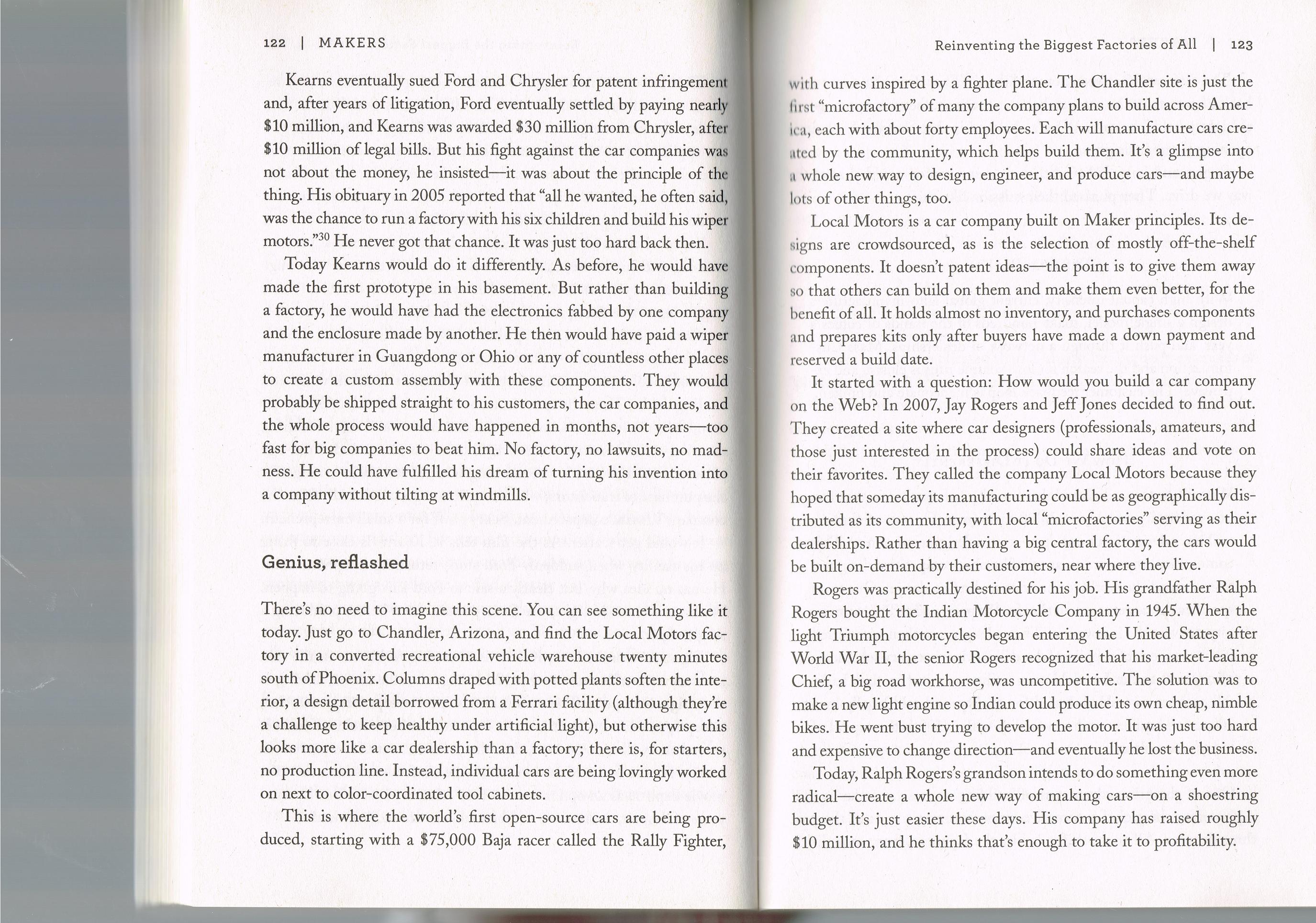
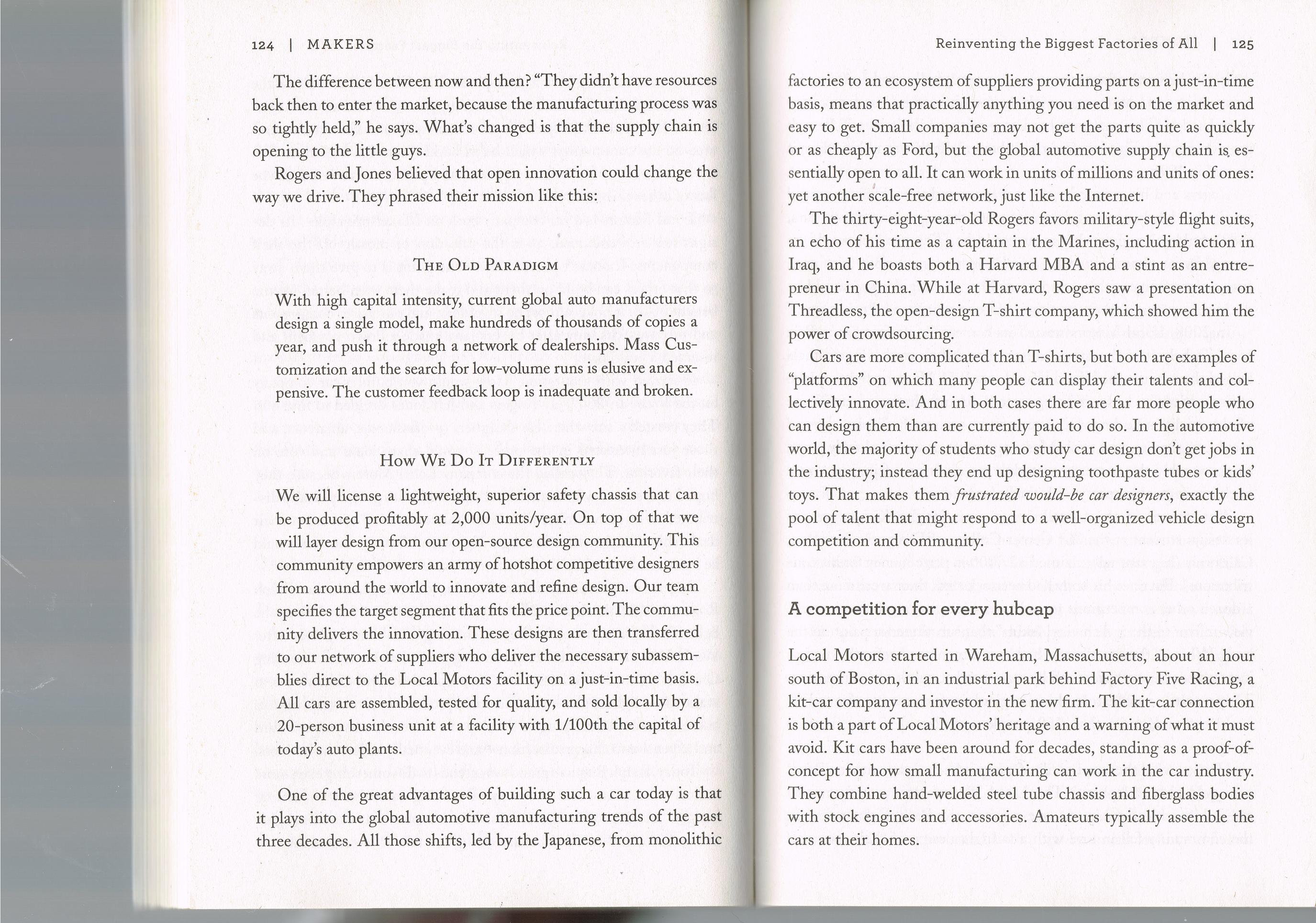
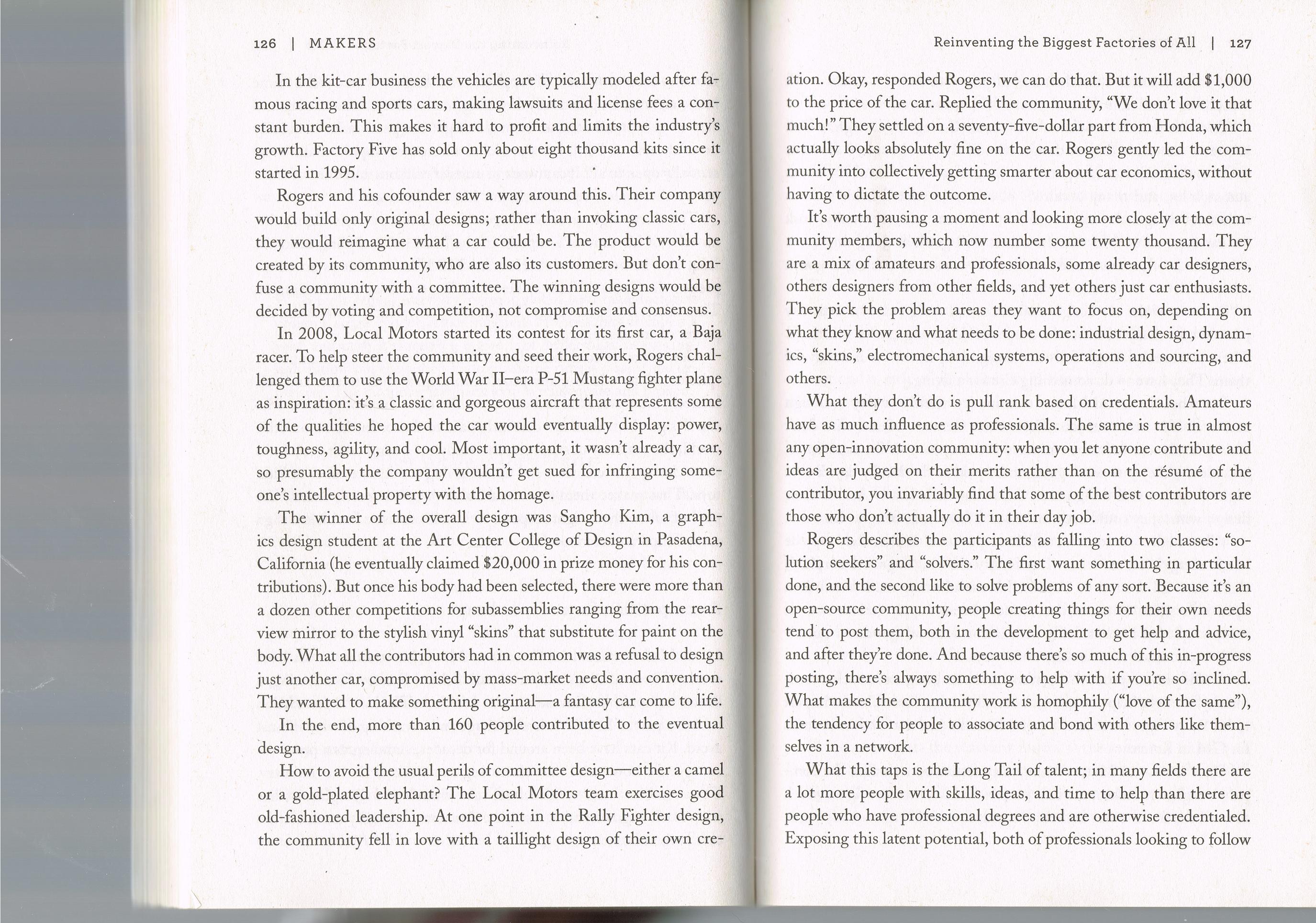
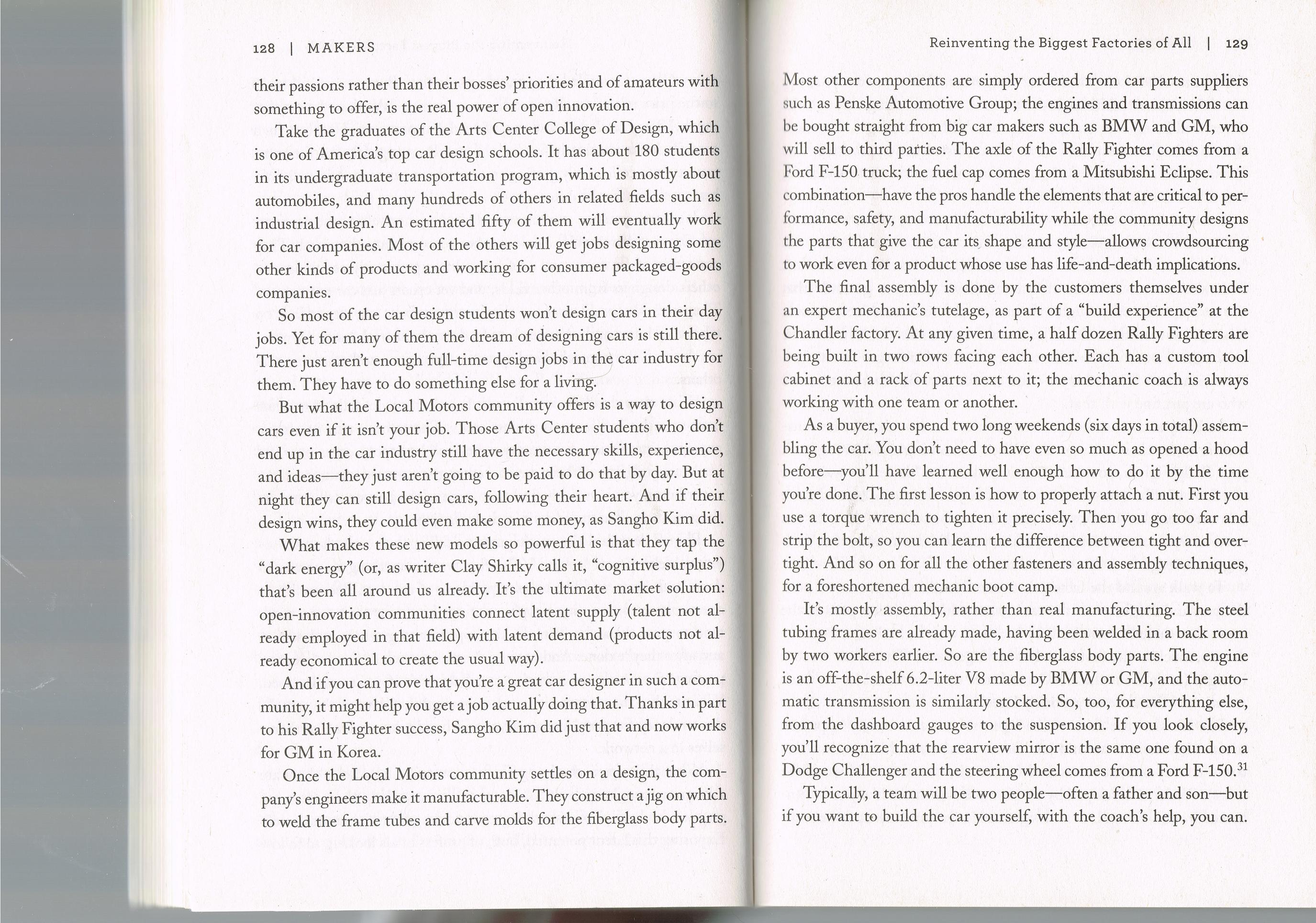
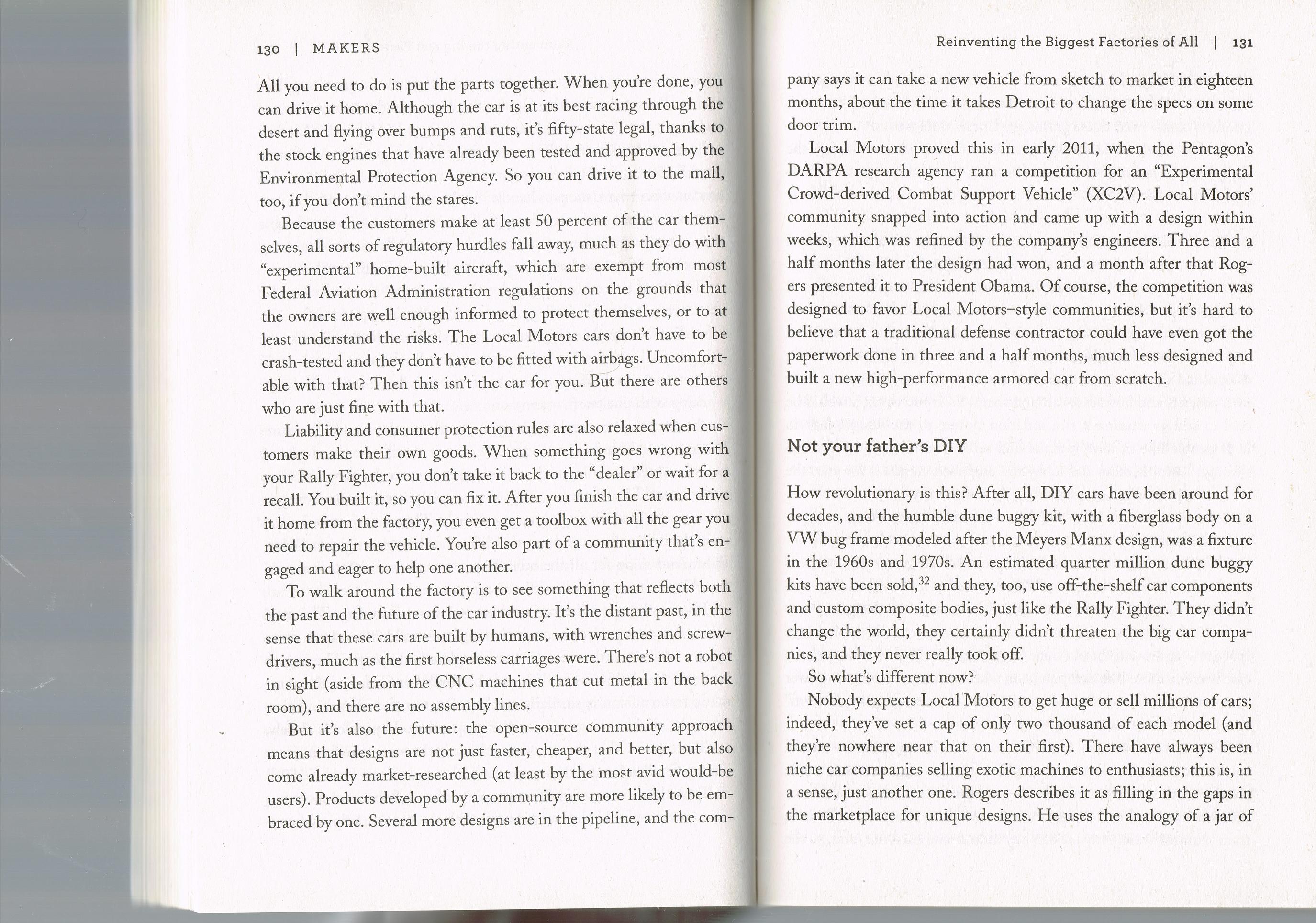
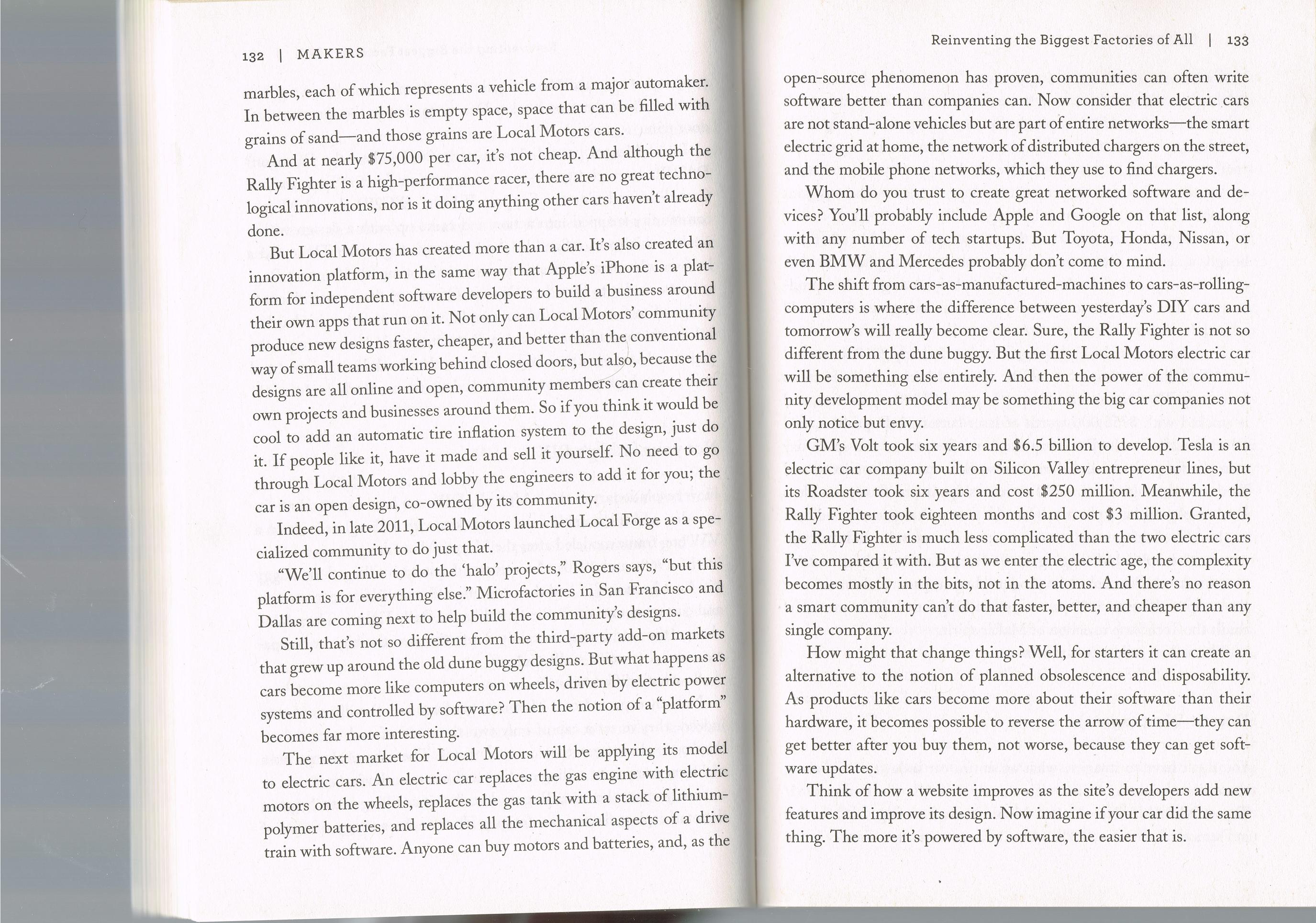
Jay Leno looks at the Rally Fighter
Basic idea of economics is that the reason we have companies is to minimise transaction costs - the organization makes it possible to achieve things you couldn't do by yourself. But we don't work with the best people - we work with whoever the company was able to hire. But with the Internet, you can find collaborators anywhere.
(London Times)
Chris Anderson is back, again pushing us, blinking and bewildered, into the future. First there was The Long Tail, the book that told us how the internet could sell us anything. Then there was Free, which said it would all be, well, free. Now there is Makers, which tells us, in essence, that we must all become factories.
Anderson, the editor-in-chief of technology magazine Wired, has a gift for seizing on something you may have been aware of in the background of your browsing, then thrusting it into the foreground and telling you it is your future, like it or not. He is Silicon Valley's prime prophet, the station master of Geek Central.
The technology you may have been dimly aware of is 3D printing. Your home printer produces two-dimensional sheets, but now there are printers that build three-dimensional objects. Out of a bath of fluid or powder, any solid object, previously specified on your computer, can be made to appear. Anderson's case is that this is the equivalent of James Hargreaves's spinning jenny, the Lancashire gadget that, in 1764, launched the industrial revolution. The jenny made something - yarn - faster and cheaper than ever before, and the 3D printer does the same, except it can make anything. This is a hot topic. As I was reading this book, a news item appeared on my computer about a Wiki Weapon Project that would provide a blueprint that would let people print handguns at home. Almost daily such schemes - whimsical or lethal - are being reported.
Up to now, computer technology has created fortunes and giant companies out of thin air, or, rather, out of the fizzing electrons of the virtual world. Insofar as physical objects - such as, say, newspapers or CDs - are involved, they are only there to be converted from atoms into bits. But the new game is to convert bits into atoms.
So far so clear - well, not completely. Anderson slows things up with a boiler-plate history of Manchester and manages to call the river Irwell the Mersey. He can be a touch sloppy. His writing is also pancake-flat and embarrassing when it tries not to be - for example, he calls the jenny 'an inflection point in the arc of history', a phrase that only PowerPoint jockeys could possibly admire.
Anderson's problem is that 3D printing is in its infancy. Objects made out of more than one material, for example, are hard to print. As a result, it is far from clear that, out of all the technologies currently around, this is the one that will spark a revolution. He tells plenty of fun stories about the hacker culture surrounding these machines and about his own efforts to get on board. He has precisely specified doll's-house furniture made for his children, and has launched a build-your-own drone company. There is even an appendix on how to become a maker. But this is hobbyist stuff.
In fact, it becomes clear as the book progresses, the real story is not about technology but about the structure of manufacturing. As 3D printers improve, it is conceivable that members of the beleaguered middle classes - engineers, architects, designers - will abandon their companies and will design and prototype their products at home. If these are customised and niche market products, they might also manufacture and sell them. But, if they are for the mass market, they will have to contract out the manufacturing process to what will, in effect, be an old-tech factory.
There is a further problem that Anderson elucidates on the basis of his own entrepreneurial experience. There are no economies of scale with these machines. Once you have bought your printer, making 1,000 objects costs 1,000 times as much as making one. This puts such manufacturing at a severe disadvantage.
Anderson is probably a better authority than most at futurology. But, as Woody Allen said, if you want to make God laugh, tell him your plans for the future. On the other hand, this could be just the technology the demoralised middle classes need, the high-tech route back to the cottage industry and the end of the miseries of office life.
More books on Inventions
Books by Title
Books by Author
Books by Topic
(London Times)
Chris Anderson is back, again pushing us, blinking and bewildered, into the future. First there was The Long Tail, the book that told us how the internet could sell us anything. Then there was Free, which said it would all be, well, free. Now there is Makers, which tells us, in essence, that we must all become factories.
Anderson, the editor-in-chief of technology magazine Wired, has a gift for seizing on something you may have been aware of in the background of your browsing, then thrusting it into the foreground and telling you it is your future, like it or not. He is Silicon Valley's prime prophet, the station master of Geek Central.
The technology you may have been dimly aware of is 3D printing. Your home printer produces two-dimensional sheets, but now there are printers that build three-dimensional objects. Out of a bath of fluid or powder, any solid object, previously specified on your computer, can be made to appear. Anderson's case is that this is the equivalent of James Hargreaves's spinning jenny, the Lancashire gadget that, in 1764, launched the industrial revolution. The jenny made something - yarn - faster and cheaper than ever before, and the 3D printer does the same, except it can make anything. This is a hot topic. As I was reading this book, a news item appeared on my computer about a Wiki Weapon Project that would provide a blueprint that would let people print handguns at home. Almost daily such schemes - whimsical or lethal - are being reported.
Up to now, computer technology has created fortunes and giant companies out of thin air, or, rather, out of the fizzing electrons of the virtual world. Insofar as physical objects - such as, say, newspapers or CDs - are involved, they are only there to be converted from atoms into bits. But the new game is to convert bits into atoms.
So far so clear - well, not completely. Anderson slows things up with a boiler-plate history of Manchester and manages to call the river Irwell the Mersey. He can be a touch sloppy. His writing is also pancake-flat and embarrassing when it tries not to be - for example, he calls the jenny 'an inflection point in the arc of history', a phrase that only PowerPoint jockeys could possibly admire.
Anderson's problem is that 3D printing is in its infancy. Objects made out of more than one material, for example, are hard to print. As a result, it is far from clear that, out of all the technologies currently around, this is the one that will spark a revolution. He tells plenty of fun stories about the hacker culture surrounding these machines and about his own efforts to get on board. He has precisely specified doll's-house furniture made for his children, and has launched a build-your-own drone company. There is even an appendix on how to become a maker. But this is hobbyist stuff.
In fact, it becomes clear as the book progresses, the real story is not about technology but about the structure of manufacturing. As 3D printers improve, it is conceivable that members of the beleaguered middle classes - engineers, architects, designers - will abandon their companies and will design and prototype their products at home. If these are customised and niche market products, they might also manufacture and sell them. But, if they are for the mass market, they will have to contract out the manufacturing process to what will, in effect, be an old-tech factory.
There is a further problem that Anderson elucidates on the basis of his own entrepreneurial experience. There are no economies of scale with these machines. Once you have bought your printer, making 1,000 objects costs 1,000 times as much as making one. This puts such manufacturing at a severe disadvantage.
Anderson is probably a better authority than most at futurology. But, as Woody Allen said, if you want to make God laugh, tell him your plans for the future. On the other hand, this could be just the technology the demoralised middle classes need, the high-tech route back to the cottage industry and the end of the miseries of office life.
More books on Inventions
Books by Title
Books by Author
Books by Topic